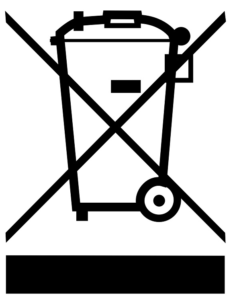Our indoor golf equipment should give you as much pleasure as possible for as long as possible. However, it is unavoidable that electronic devices occasionally reach the end of their life cycle.
In accordance with our responsibility as a manufacturer and distributor as defined by the WEEE Directive, we would like to inform you about the proper disposal of our products so that we can work together to conserve our planet’s resources. Please observe the following instructions in the interests of your own safety and the environmentally friendly disposal of old appliances.
What does the WEEE Directive regulate?
The EU Directive 2012/19/EU on waste electrical and electronic equipment (‘WEEE Directive’ for short) regulates the placing on the market, take-back and environmentally sound disposal of waste electrical and electronic equipment (‘WEEE’). The WEEE Directive obliges all distributors to take back and dispose of these goods in accordance with specified ecological standards. By participating in a licenced collection and recycling system, we fully comply with the requirements of this directive.
Make sure you dispose of them correctly – for the sake of our environment!
Not all waste should be disposed of with household waste. Old appliances do not belong in household waste! In this respect, they must be collected separately and disposed of, for example, via the local collection and return systems. Consumers who use old appliances must also separate old batteries and accumulators that are not enclosed in the old appliance, as well as lamps that can be removed from the old appliance without destroying them, from the old appliance before handing them in at a collection point.
Proper disposal optimises the recovery and recycling flow and prevents potentially hazardous substances from harming your health and our environment.
How can you recognise that an appliance should be disposed of separately from household waste?
The symbol of a crossed-out wheelie bin indicates to consumers that old appliances must be disposed of separately from household waste at the end of their service life. This symbol can be found on the appliance itself and/or in the accompanying information. 
Where can you return old appliances
To dispose of electrical and electronic appliances correctly, you can use public collection points in your neighbourhood.
As a distributor, New Golf GmbH participates in the licenced collection and recycling system of ERA Elektro Recycling Austria GmbH (ERA) in Austria. An extensive network of municipal collection centres for electrical appliances and batteries as well as regional ERA collection points are available in Austria, where you can return your old (household) electrical appliances and batteries free of charge.
In principle, distributors/retailers in the EU are obliged to take back an old appliance free of charge at the consumer’s request if the consumer buys a new appliance with the same function/design. In the case of clear information in shops with a sales area of less than 150 m2 , appliances do not have to be taken back. Consumers in the mail order business are also entitled to return old electrical appliances to distributors/retailers by post or delivery service when purchasing a new appliance or old batteries (these can also be returned independently of a new purchase).
What needs to be considered with rechargeable batteries?
Please leave installed batteries in the device and do not attempt to remove them. Batteries should be fully discharged before disposal to avoid a possible short circuit and the risk of fire. For more information on the correct disposal of old appliances, please contact your local authority or waste disposal service.
Note on data privacy
Old devices that are to be disposed of may contain sensitive personal data (e.g. on a smartphone). Please note that consumers of old devices are responsible for ensuring that any personal data stored on the old device is deleted.
Collection and recycling rates
We are required by law to provide information on the status of fulfilment of quantitative targets (collection and recycling rates). Under the WEEE Directive, all member states are obliged to collect data on waste electrical and electronic equipment and report it to the Commission.
Thank you for your help!
The following information is intended for consumers who use batteries or products with built-in batteries (e.g. rechargeable batteries). Please follow the instructions in the interest of your own safety and the environmentally friendly disposal of used batteries/rechargeable batteries. Proper disposal of batteries conserves our planet’s resources.
Make sure you dispose of them correctly – for the sake of our environment!
Consumers must not only dispose of used electrical appliances, but also used batteries properly – and separately from household waste. Waste batteries do not belong in household waste! Consumers are legally obliged to return used batteries. In this respect, they must be collected separately in order to ensure proper disposal, e.g. via local collection and return systems.
Proper disposal optimises the recovery and recycling flow and prevents potentially hazardous substances (e.g. batteries containing lithium) from harming your health and our environment.
How do you recognise that used batteries must be disposed of separately from household waste?
The crossed-out wheeled bin symbol on the batteries indicates to consumers that used batteries must be disposed of separately from household waste. Batteries that contain more than 0.0005 per cent mercury (Hg) or more than 0.002 per cent cadmium (Cd) or more than 0.004 per cent lead (Pb) by mass are labelled with the chemical name of the pollutant used under the waste bin symbol.
Where can you return used batteries?
Consumers can return used batteries free of charge after use to a municipal collection centre or local retailer. Distributors of batteries are also obliged to take back used batteries. However, this take-back obligation is limited to waste batteries of the type that distributors carry or have carried as new batteries in their product range. In the event of a take-back obligation, consumers can return used batteries to the distributor with sufficient postage.